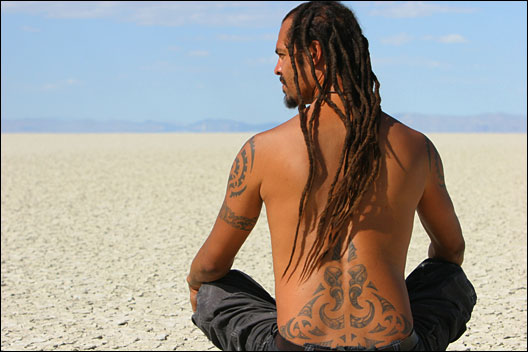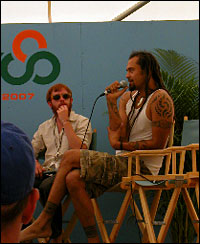
“Everyone deserves music, sweet music,” Michael Franti sings in the title track from a 2003 album. The man behind Michael Franti & Spearhead — a band that blends hip-hop with jazz, folk, and funk music — also believes that everyone deserves health care, social justice, and a sustainable planet. And he makes sure you know it — whether he’s talking with the press, his fans, or a vendor.
For almost 10 years, Franti has organized the Power to the Peaceful Festival, a yearly concert in San Francisco that raises awareness and funds for social, environmental, and political change. This December, Franti is taking the festival international for the first time, with performances in Sao Paulo, Brazil. He’s also making sure the event is run on green energy, recycles all of its waste, and offers organic food options.
I caught up with Franti (and even got a kiss!) during my trip to the Bonnaroo Music & Arts Festival this year. Dressed in camo shorts and a white tank, his tatt’ed arms bare to the nonexistent breeze, Franti looked ready for the stifling heat of a dry Tennessee summer. He sat on the steps leading up to a hay-bale-covered trailer while we talked about everything from greening the music industry to instituting national health care, and the conversation flowed as easily as his funky reggae pop.
What are you doing as a band to lessen your footprint as you’re touring around?
I do stuff as an individual, and as a band, and as a concert promoter. As an individual, in our house, we stopped allowing plastic bags (we only use cloth bags), changed all our light bulbs, and have done weather stripping and other stuff to make our home more efficient. We recycle everything and compost everything.
As a band, we’ve done the same thing. In our tour rider, we have a requirement that things have to be recyclable, and we recycle on our bus. This fall, our bus is switching to biodiesel. We try as much as we can to use organic cottons for our merch and hemp paper for our CDs.
As a concert promoter, from the start, we’ve always recycled at the Power to the Peaceful Festival. But every year, it’s like a fine-tuning thing: What can we do to make the festival better? We require all of the vendors to use biodegradable plates, forks, and so forth, and we use biodiesel generators for our stages. Every year, you find something new that you can do.
You talk a lot about your involvement in social causes when you’re on stage. As an artist, do you feel like fans respond to that and change their actions based on what you’re saying?
The main thing that we try to do is make people have fun and to feel something. And within the songs that I write, there are always seeds planted in the lyrics. So I don’t have to really talk so much in between songs. It’s already there.
But the main thing is I feel like inspiring people to be a part of this change that’s taking place in this country and around the world. [Change] is a good thing, and it’s an enjoyable thing, and it’s something that we take away from our experiences and feel proud of when we look back.
I noticed an amazing difference in my own household when we stopped using plastic bags. Suddenly, this mound of plastic bags that lived under our sink was gone in a few days, and it didn’t come back. And that felt really good.
I see you’re not wearing shoes — are you making a statement with that? It seems to fly in the face of the bling culture in hip-hop right now.

Footloose and shoe-free at Bonnaroo.
Photo: Sarah van Schagen
I don’t wear shoes; I didn’t stop wearing shoes out of any form of protest or any form of trying to make any message. I just don’t wear shoes because I prefer not to wear shoes.
But in terms of the greed and the I-get-mine-and-fuck-you- if-you-can’t-get-yours attitude, I feel like that’s something that needs to change — throughout our whole society. Hip-hop is a really good place to start because it has such a strong influence on young people.
As the presidential elections come up, what would your ideal candidate look like?
I feel like this country is controlled by corporate interests more than anything else, and I think we need a candidate who is skillful at helping corporate interests to understand — because they’re not going to go away — that when you treat people with respect and you treat the environment with respect, the corporation will be successful over the long term. And that’s been shown time and time again.
I also think we need somebody who can also show this country and show the rest of the world that a nation that treats its neighbors as brothers and sisters and not as enemies will be one that prospers and will make a planet that prospers.
We need to stop the war; we need to get health care on track in this country for people; we need to be serious about environmental issues; we need to do work around the world to bring an end to poverty; and I think more than anything else, we need to help people to get on track economically. That will do more to fight the “War on Terrorism” than blowing up villages.
How can the music industry really make some big green steps, and do you think it’s moving in that direction, or is it all sort of a PR trend?
I feel like music has a great opportunity to do two things: One is to be an example of an industry that can green itself. For example, we did these shows at the Fillmore [Auditorium] in Denver two nights last fall, and we asked the Fillmore to get biodegradable cups for that weekend. So they went to Miller Beer, and they talked to them about it, and they said, “We need 25,000 cups for these two shows.” And Miller Beer was like, “Yeah, we’ll do that,” but not only did they buy 25,000 cups — because for them, that’s nothing — they bought half a million cups from this biodegradable company and then used them at some of their other shows.
If we can, as an industry, start to require that at venues, then just imagine what that will do to help those cup companies get on their feet. It will do good in terms of positive image for Miller Beer, and it does something good to help community and people, when we come to the shows and feel good about buying their beer. So it all works hand-in-hand. People have to start having that long-range vision instead of that short-term, “Oh, these cups cost two cents more each” or whatever.
The other thing is that music can help with awareness through the music itself. Musicians have a voice that’s heard by other people, and when that message comes through those songs, it means a lot to people and it gives people inspiration, when they wake up every morning, to stay on that path.


